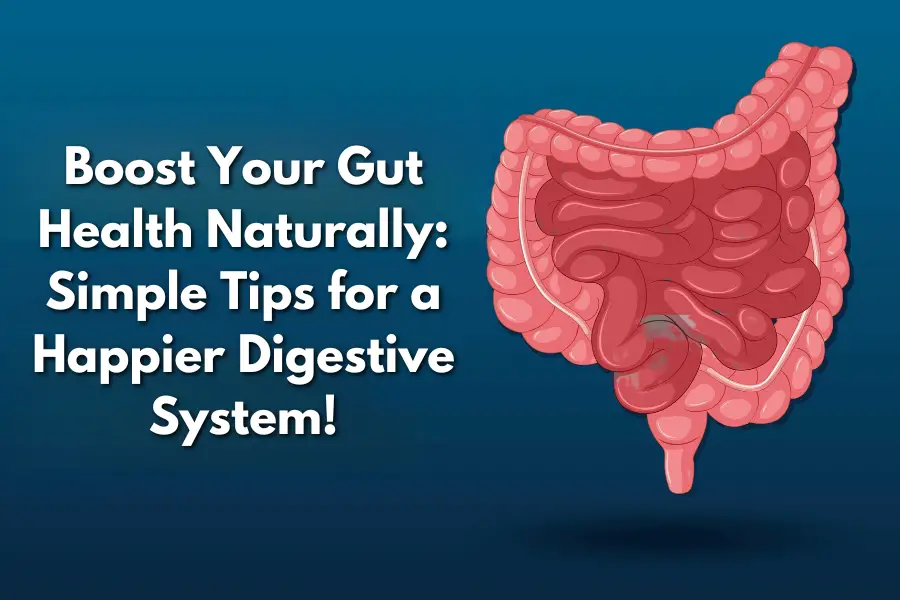Improve Gut Health: Your digestive system plays a critical role in maintaining your health. When your gut isn’t functioning properly, it can lead to various issues affecting your entire body. Many people today suffer from bloating, indigestion, constipation, and other digestive problems.
Let’s explore how to naturally enhance your gut health and enjoy better digestion.
Why is Gut Health Important?
Your gut is more than just a place where food is digested; it’s the cornerstone of your immune system. The gut is home to trillions of beneficial bacteria that help protect against inflammation, infections, and other health issues. When your gut is healthy, it keeps problems like bloating, constipation, and diarrhea at bay.
But that’s not all—your gut health significantly affects your mental well-being. Studies show that there’s a strong connection between the gut and the brain, often referred to as the “gut-brain axis.” Poor gut health can lead to issues like stress, anxiety, and even depression. Taking care of your gut doesn’t just improve digestion; it’s essential for mental peace too.
Easy and Natural Ways to Improve Gut Health
1. Eat Fiber-Rich Foods
Fiber is a digestive system’s best friend. It aids in smooth digestion and helps prevent constipation. Incorporate plenty of fresh fruits, vegetables, oats, lentils, and whole grains into your diet. Fiber also supports the growth of good bacteria in your gut, promoting a balanced microbiome.
2. Include Probiotics
Probiotics are live bacteria that benefit your gut by boosting the number of good microorganisms. Foods like yogurt and pickles are rich in probiotics. Adding these to your meals can significantly improve your gut health, digestion, and immunity.
3. Stay Hydrated
Water is crucial for a healthy digestive process. Drinking enough water ensures smooth bowel movements and prevents dehydration, which can lead to constipation. Aim for 8-10 glasses of water daily and include hydrating foods like cucumbers and watermelons in your diet.
4. Manage Stress Levels
Chronic stress can put damage on your digestive system. High-stress levels slow down gut function, causing issues like gas, bloating, and irregular bowel movements. Try stress-relief techniques like yoga, meditation, or deep breathing exercises to calm your mind and support your gut.
5. Use Spices and Herbs
Natural spices like ginger, turmeric, cumin, and fennel can work wonders for your digestive health. They reduce inflammation, improve digestion, and relieve bloating. Add these spices to your meals for a gut-friendly diet.
6. Avoid Late-Night Eating
Eating late at night disrupts your digestion and leads to bloating and acidity. Try to have dinner at least 2-3 hours before bedtime to give your body enough time to digest the food properly.
7. Try Natural Drinks
Herbal teas and infused waters can do wonders for your gut. Mint tea, fennel water, and ginger tea are excellent for soothing the stomach and aiding digestion. Sip on these drinks regularly to keep your gut happy.
8. Stay Active
Regular physical activity improves gut motility and enhances digestion. A simple 30-minute walk, yoga session, or light exercise can significantly benefit your digestive system. Movement encourages healthy bowel function and reduces bloating.
When to Consult a Doctor
If you’re implementing these tips and still experiencing persistent digestive issues like abdominal pain, bloating, chronic diarrhea, or loss of appetite, it’s essential to consult a doctor. These could be signs of underlying gut conditions requiring medical attention.
Conclusion
Your gut health is directly linked to your overall well-being. By making simple lifestyle changes like eating a balanced diet, staying hydrated, and managing stress, you can significantly improve your digestive health. A healthy gut doesn’t just prevent stomach problems; it boosts your immunity, enhances your mental health, and improves your quality of life. Start prioritizing your gut health today for a healthier tomorrow!
Also Read: These 4 Signs Reveal You’re Lacking Vitamin D This Winter!







Leave a Reply